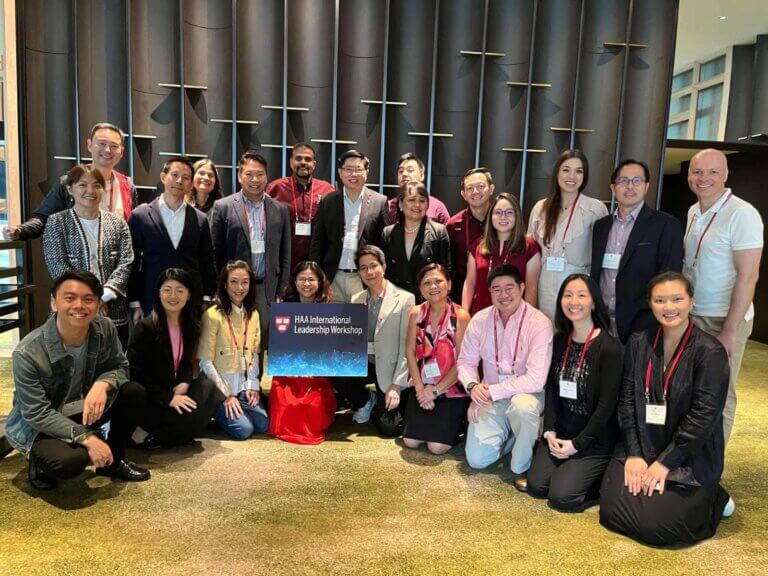Last Saturday, I had the privilege of moderating an engaging session at the Harvard Alumni Association International Leadership Workshop in Singapore. Titled “Organizational Insights: An Open Forum,” this session provided a dynamic platform for Club and Shared Interest Group (SIG) leaders to share best practices, innovative ideas, and strategies for building thriving alumni communities.
A Unique Format for Shared Learning
This session departed from the traditional panel format to embrace a more innovative approach: panelists posed questions to the audience, encouraging participants to share their wisdom and experiences. Inspired by the 2019 Leadership Workshop in Amsterdam, this interactive method sparked lively discussions and meaningful collaboration, empowering everyone to learn from one another.
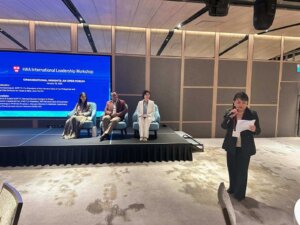
Spotlight on Panelists
Three accomplished alumni leaders from diverse regions guided the discussions:
- Mohra Al Zubair (ALM ’17) – HAA Contact in Oman (Middle East)
- Antonio Copete (AM ’04, PhD ’13) – Representative of the Harvard Club of Colombia (Latin America)
- Tianwang Liu (PhD ’22) – Leader of the Harvard Women in Defense, Diplomacy, and Development Alumni Network (W3D SIG)
Key Discussions and Takeaways
1. Building a Strong Leadership Team and Engaged Membership (Middle East)
Mohra Al Zubair began the session by sharing her experiences as the HAA Contact in Oman and discussing the challenges of sustaining alumni engagement. These strategies highlighted the importance of structure, consistency, and cultural alignment in creating impactful alumni communities. The audience contributed practical suggestions, including:
- Forming a core leadership team: A committed group of leaders is vital for planning, organizing, and maintaining community momentum.
- Focusing on core membership: Establishing a reliable base of 30–40 active members creates a strong foundation for long-term activities.
- Leveraging cultural relevance: Hosting events that align with local customs and alumni interests increases participation and fosters connection.
- Organizing a signature event: Signature gatherings, such as those by the Harvard Club of the U.A.E., establish a club’s identity and build excitement.
- Engaging families: Including alumni families in events enhances the sense of community and encourages participation.
2. Defining Value Propositions and Broadening Engagement (Latin America)
Antonio Copete sought input from participants on how to define and communicate a club’s value proposition to attract and retain members, particularly for paid memberships. The conversation emphasized the importance of understanding the unique needs of alumni and creating opportunities for meaningful engagement. The audience shared the following ideas:
- Conducting surveys: Understanding alumni interests allows clubs to tailor programs that resonate with their members.
- Engaging younger alumni: Involving recent graduates fosters continuity and long-term commitment.
- Offering diverse programming: Providing varied events—like those organized by the Harvard Club of France—ensures inclusivity and broad appeal.
- Organizing a signature event: A marquee event establishes a club’s identity and serves as a reliable draw for members.
3. Creating Successful Events and Fostering Respectful Dialogue (W3D SIG)
Tianwang Liu sought input on two critical areas: designing successful events and fostering respectful dialogue among members with differing viewpoints. The discussion produced several actionable insights:
Creating Successful Events:
- Define the purpose: Events should align with the group’s mission and deliver clear value to participants.
- Understand your audience: Tailor events to reflect the interests and needs of the community.
- Collaborate on planning: Engage members in planning to foster ownership and enthusiasm.
- Evaluate and iterate: Gather feedback after events to refine future programming.
Fostering Respectful Dialogue:
- Set ground rules: Establish clear guidelines to ensure discussions remain respectful and inclusive.
- Encourage active listening: Promote empathy and understanding by encouraging participants to listen before responding.
- Moderate effectively: Assign neutral moderators to guide conversations and address tensions if needed.
- Build trust: Create safe spaces where members feel comfortable sharing differing perspectives.
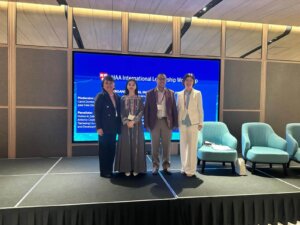
These approaches emphasized the importance of thoughtful planning, inclusivity, and open communication in building a cohesive and impactful alumni network.
Wrap-Up and Reflections
The session concluded with a powerful reminder of the value of collaboration and shared learning. By fostering open dialogue and building strong leadership structures, alumni communities can adapt to changing needs and thrive over the long term.
Final Thoughts
Moderating this session was an inspiring experience reaffirming the power of bringing diverse perspectives together. The strategies and insights shared by panelists and participants underscored the strength of Harvard’s global alumni network and its unwavering commitment to excellence, inclusivity, and leadership.
As we move forward, I hope these takeaways serve as a valuable guide for building vibrant and impactful alumni communities worldwide.
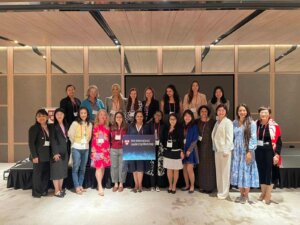
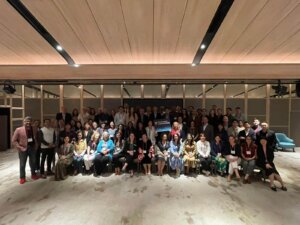
Get Inspired by Harvard Alumni Leadership Insights
Are you looking to elevate your organization’s leadership strategies and community engagement? Learn from the best with insights from the recent Harvard Alumni Leadership Workshop in Singapore. John Clements Consultants specializes in leadership development and helping organizations build strong, effective teams.
Ready to apply these insights to your organization? Contact us today and learn how our tailored solutions can help you foster growth and collaboration.

